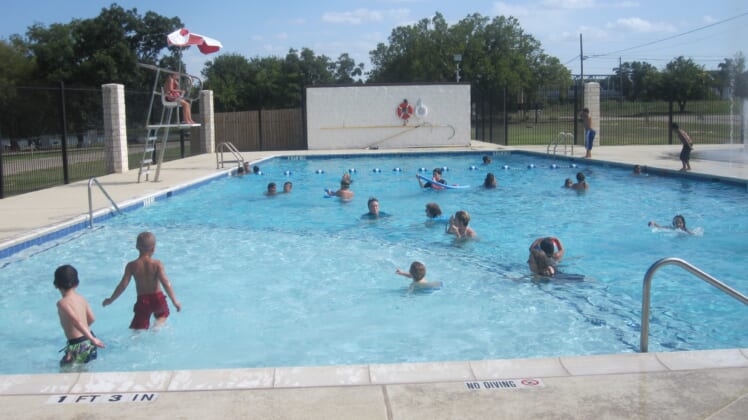How to Enjoy Your Public Pool and Stay Healthy

[bc_video video_id=”5480080509001″ account_id=”5374160583001″ player_id=”HJtnW6IQW”]
For lots of people, summer means days of relaxation and time spent with family and friends. You might opt for a camping trip one weekend and go to the pool the next, spending time in the summer sun. While you’re swimming in public waters all day, though, you should take extra precautions to keep you and your family healthy at the pool.
Why should you worry about your physical health while swimming? It’s the perfect place for bacteria and germs. When the Centers for Disease Control and Prevention goes through large inspections of various public pools, they find that as many as 1 out of 8 need immediate attention.
One main reason for such poor pool health is an unbalanced pH in the water. If a pool does not have careful monitoring, a chemical called chloramine can build up in it.
Basically, chloramines form when oil, sweat, and urine from swimmers mix with the chlorine in the water. Chloramine does not kill as many bacteria as chlorine and actually creates that strong chemical smell that pools are known for. The next time you go swimming, you might just want to talk to a supervisor if you notice an excessively strong pool smell.
Dangerous Bacteria
Even if the pool has a balanced pH, you still have a few potential dangers lurking in the water. Recently, the United States has seen a rise in water-borne illnesses, such as sickness caused by the parasite cryptosporidium, or crypto.
According to the CDC, the parasite spreads easily when others ingest something that has touched the feces of a sick person. Unfortunately, many people who have diarrhea or any other sickness often still get in the water.
They don’t want to miss out on the swimming fun. If someone else swallows even a small amount of that water, however, he could have painful cramps, stomach discomfort, and diarrhea for up to three weeks.
Since crypto can withstand the usual levels of pool chlorine that kill most other bacteria, it can actually live in the water for several days. That fact keeps the risk for the illness high at pools where the water and hygiene rules are not properly maintained.
In 2016, the state of Ohio had nearly 2,000 cases of crypto compared to 570 in previous years. Nationally, the CDC has reported a doubled rate of crypto outbreaks since 2014, alarming health professionals about the common hygiene of swimmers in public pools. Swimmers and pool owners alike need to work together to reduce these outbreaks.
Staying Healthy
Swimmers can avoid such water-borne illnesses like crypto with a few simple steps for pool hygiene.
- Don’t get in the water if you’re sick.
While this step might seem like a no-brainer, many people go for a swim while sick. Unfortunately, if pools have not maintained proper chlorine levels, even common germs can spread in water.
Simply stay out of the water if you have been sick. Experts advise that you stay away for two weeks if you get sick with diarrhea.
2. Test the water.
Because so many public pools have problems with proper chlorine levels, you should stay aware when at the pool. If you notice a strong chemical smell, avoid swimming.
In addition, you might want to investigate the pool for broken or rusty filters and grimy pool walls. These could indicate improperly maintained water, and you should notify a pool official immediately.
3. Rinse off before getting in.
This step alone could save many people from illness, washing away bacteria and inhibiting dirt and oil. According to a survey by the Water Quality and Health Council, over 40 percent of swimmers don’t shower before jumping in.
4. Take care of the kids.
You already know that children need more breaks than adults, especially bathroom breaks. The pool provides no exception. Take children to the restroom every 30—45 minutes, making sure to rinse off before returning.
Adults should take regular breaks from swimming too. Also, keep clean diapers on babies by changing them away from the pool area in a restroom or changing station.
While you can have loads of fun at public pools in the summer, watch out for others’ health and safety first. You should stay aware of pool conditions and harmful situations before your swim. Then, be sure to take breaks and rinse off carefully to keep germs out of the pool. Every swimmer needs to do his part to keep the pool safe and fun for everyone.
